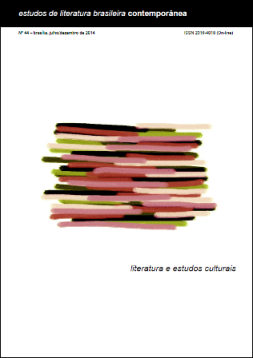Estudos culturais latino-americanos:
configurações de um sintagma
DOI:
https://doi.org/10.1590/2316-4018443Resumo
Este ensaio revisa os debates e embates que, ao longo das últimas décadas, marcaram os vínculos entre os chamados estudos culturais e o latino-americanismo. Entre interesses comuns, pontos de convergência, contraposições e antagonismos, as tensões que caracterizam as duas partes de um sintagma como “estudos culturais latino-americanos” serviram para repensar os campos de estudo, as práticas e os saberes e também os modos pelos quais as ideias circulam e as políticas acadêmicas se estabelecem em um contexto marcado pela diversidade de locais enunciativos e pela reformulação das categorias epistêmicas.
Downloads
Referências
CASTRO-GÓMEZ, Santiago; MENDIETA, Eduardo (1998). Teorías sin disciplina (latinoamericanismo, poscolonialidad y globalización en debate). México: Miguel Ángel Porrúa.
CASTRO-GÓMEZ, Santiago; GROSFOGUEL, Ramón (2007). El giro decolonial: reflexiones para una diversidad epistémica más allá del capitalismo global. Bogotá: Siglo del Hombre Editores.
MIGNOLO, Walter (2000). Local history/global designs. Princeton: University of Princeton Press.
MIGNOLO, Walter (2007). El pensamiento decolonial: desprendimiento y apertura. In: CASTRO-GÓMEZ, Santiago, GROSFOGUEL, Ramón. El giro decolonial: reflexiones para una diversidad epistémica más allá del capitalismo global. Bogotá: Siglo del Hombre Editores. p. 25-46.
MORAÑA, Mabel (Org.) (2000). Nuevas perspectivas desde/sobre América Latina: el desafío de los estudios culturales. Santiago: Cuerpo propio.
MOREIRAS, Alberto (2001). A exaustão da diferença: a política dos estudos culturais latino-americanos. Belo Horizonte: UFMG.
QUIJANO, Aníbal (2000). Colonialidad del poder, eurocentrismo y América Latina. In: LANDER, Edgardo (Comp.). La colonialidad del saber: eurocentrismo y ciencias sociales. Perspectivas Latinoamericanas. Buenos Aires: CLACSO. Disponível em: <http://goo.gl/6HDbuv>. Acesso em: abr. 2014.
Downloads
Publicado
Como Citar
Edição
Seção
Licença
Autores que publicam nesta revista concordam com os seguintes termos:
a) Os(as) autores(as) mantêm os direitos autorais e concedem à revista o direito de primeira publicação, sendo o trabalho simultaneamente licenciado sob a Licença Creative Commons de Atribuição-Não Comercial 4.0, o que permite o compartilhamento do trabalho com reconhecimento da autoria do trabalho e publicação inicial nesta revista.
b) Os(as) autores(as) têm autorização para assumir contratos adicionais separadamente, para distribuição não-exclusiva da versão do trabalho publicada nesta revista (ex.: publicar em repositório institucional ou como capítulo de livro), com reconhecimento de autoria e publicação inicial nesta revista.
c) Autores têm permissão e são estimulados a publicar e distribuir seu trabalho on-line (ex.: em repositórios institucionais ou na sua página pessoal) após o processo editorial, já que isso pode gerar alterações produtivas, bem como aumentar o impacto e a citação do trabalho publicado (Veja O Efeito do Acesso Livre).
d) Os(as) autores(as) dos trabalhos aprovados autorizam a revista a, após a publicação, ceder seu conteúdo para reprodução em indexadores de conteúdo, bibliotecas virtuais e similares.
e) Os(as) autores(as) assumem que os textos submetidos à publicação são de sua criação original, responsabilizando-se inteiramente por seu conteúdo em caso de eventual impugnação por parte de terceiros.


